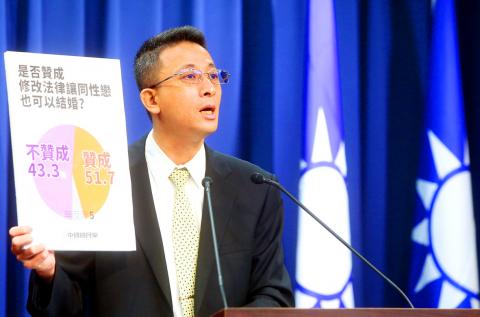More than half of Taiwanese are in favor of legalizing same-sex marriage, but lean toward the promulgation of a new act to achieve the goal, according to a survey released yesterday by the Chinese Nationalist Party (KMT), which called for public hearings to be held to solicit more opinions.
The poll, conducted on Tuesday and Wednesday last week by Trend Survey and Research at the behest of the KMT, found that 51.7 percent of respondents supported amendments aimed at legalizing homosexual unions, compared with 43.3 percent who disapproved.
As for the issue of how to legalize same-sex marriage, 53.3 percent of those polled said they preferred promulgating a “civil partnership bill,” while 32.2 percent said they favored amending the Civil Code.

Photo: CNA
Only 0.4 percent of the respondents supported both approaches, with 4.9 percent liking neither, the survey showed.
Among the respondents 64.1 percent said they think that having a separate law would not discriminate against homosexuals; 25.5 percent said it would be a problem, while 63.3 percent said that legislative efforts should only be made after supplementary measures were put in place — given that amendments to the Civil Code could involve a wide range of legal rights — and 21.4 percent disagreed.
The poll asked respondents whether they could accept the removal of the terms “husband and wife,” “man and woman,” and “father and mother” from government documents, with 54 percent saying they did not approve and 39.6 percent saying it would be acceptable.
A majority said that marriage as it has been defined throughout history is conducive to the public interest, with 52.2 percent agreeing that procreation is central to the institution, which would exclude same-sex couples from marriage because they cannot bear children without a third party.
Forty percent said that the definition of marriage did hold procreation as a central tenet.
When it came to homosexual family members, 48.7 percent said they could not accept such a situation, while 46.1 percent said they could.
The survey collected 1,070 valid samples.
It has a confidence level of 95 percent and a margin of error of 3 percentage points.
KMT Culture and Communications Committee Deputy Director Hu Wen-chi (胡文琦) said that as opponents of same-sex marriage have resorted to various channels to express their opinions, the issue requires a much more extensive discussion to reach a higher level of public consensus.
“The government should hold more public hearings to ensure that the issue is fully discussed,” Hu said, urging the Democratic Progressive Party (DPP) to refrain from playing “good cop, bad cop” to fool the public, an apparent reference to DPP caucus whip Ker Chien-ming’s (柯建銘) remarks last week that the DPP was leaning toward enacting a separate bill, which prompted DPP Legislator Tuan Yi-kang (段宜康) to say that “Ker’s personal view dos not represent that of the DPP as a whole.”

Chinese spouse and influencer Guan Guan’s (關關) residency permit has been revoked for repeatedly posting pro-China videos that threaten national security, the National Immigration Agency confirmed today. Guan Guan has said many controversial statements in her videos posted to Douyin (抖音), including “the red flag will soon be painted all over Taiwan” and “Taiwan is an inseparable part of China,” and expressing hope for expedited reunification. The agency last year received multiple reports alleging that Guan Guan had advocated for armed reunification. After verifying the reports, the agency last month issued a notice requiring her to appear and explain her actions. Guan

A preclearance service to facilitate entry for people traveling to select airports in Japan would be available from Thursday next week to Feb. 25 at Taiwan Taoyuan International Airport, Taoyuan International Airport Corp (TIAC) said on Tuesday. The service was first made available to Taiwanese travelers throughout the winter vacation of 2024 and during the Lunar New Year holiday. In addition to flights to the Japanese cities of Hakodate, Asahikawa, Akita, Sendai, Niigata, Okayama, Takamatsu, Kumamoto and Kagoshima, the service would be available to travelers to Kobe and Oita. The service can be accessed by passengers of 15 flight routes operated by

GIVE AND TAKE: Blood demand continues to rise each year, while fewer young donors are available due to the nation’s falling birthrate, a doctor said Blood donors can redeem points earned from donations to obtain limited edition Formosan black bear travel mugs, the Kaohsiung Blood Center said yesterday, as it announced a goal of stocking 20,000 units of blood prior to the Lunar New Year. The last month of the lunar year is National Blood Donation Month, when local centers seek to stockpile blood for use during the Lunar New Year holiday. The blood demand in southern Taiwan — including Tainan and Kaohsiung, as well as Chiayi, Pingtung, Penghu and Taitung counties — is about 2,000 units per day, the center said. The donation campaign aims to boost

The Central Weather Administration (CWA) said a magnitude 4.9 earthquake that struck off the coast of eastern Taiwan yesterday was an independent event and part of a stress-adjustment process. The earthquake occurred at 4:47pm, with its epicenter at sea about 45.4km south of Yilan County Hall at a depth of 5.9km, the CWA said. The quake's intensity, which gauges the actual effects of a temblor, was highest in several townships in Yilan and neighboring Hualien County, where it measured 4 on Taiwan's seven-tier intensity scale, the CWA said. Lin Po-yu (林柏佑), a division chief at the CWA's Seismological Center, told a news conference